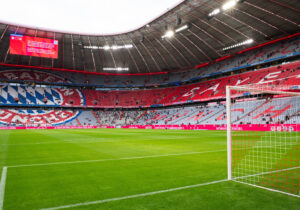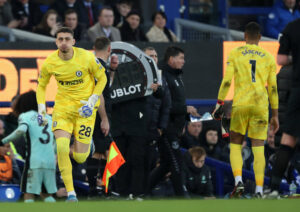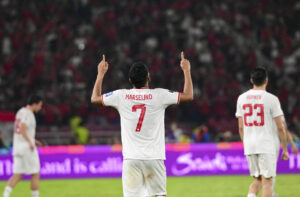In August 2018, when asked about the pressure of more fixtures from being in the Europa League, Burnley manager Sean Dyche gave an honest and interesting answer.
Wolverhampton Wanderers Thriving Despite Europa League Pressures
“It’s hard for the players because they constantly get a barrage of ‘too many games and ‘Europa’ – they looked a little bit flat,” he told TalkSport after his side’s 4-2 defeat to newly-promoted Fulham at the start of the 2018/19 season.
“All the outside noise just took an edge off our performance today and it did a little bit against Watford. We’ve got the obvious challenge of numbers. We didn’t get as many players in the market as we wanted to. We knew we needed more and that’s been clear. They’re facts, not excuses.
“There is a constant feeling that the message is: ‘too many games’, and it is a lot of games. There is a lot of travelling as well. But that’s where you’ve got to be mentally tough. It is new to them, it’s a new challenge for all of us – the recovery periods, the fact we’ve got another big game coming. It’s how we take on that challenge. But we are lacking numbers at the minute and that’s making it more of a challenge.”
Clubs Have Struggled in the Past With Added Pressure
For all the benefits of playing European football, both on and off the field, is the Europa League providing a strain on teams that do not possess the squad depth and strength of the Premier League’s ‘big six’? Dyche seems to think so and it is telling that arguably Burnley’s toughest period since earning promotion back to the Premier League in 2016 coincided with more fixtures and an earlier start to the season due to Europa League qualification.
So, you would have been forgiven for fearing that a similar fate would happen to Wolverhampton Wanderers. After a stunning first season back in the top flight, which saw them finish seventh and seal European football for 2019/20, the praise for Nuno Espirito Santo’s men was fully justified but there were bigger challenges that would await.
Could Wolves sustain their league form? How would the squad cope with an earlier start to the season and more fixtures from the Europa League? Many other teams have concluded that the competition negatively affected their league form as the physical strain on the squad increased. How Wolves would handle it would be particularly intriguing.
Initially, the signs were not good. Wolves’ season started on July 25 with a 2-0 Europa League qualifying win against Irish side Crusaders but, after playing eight games in August alone, their league form started to dip. There was no win in their first six league games and results such as a 5-2 home defeat to Chelsea, a 3-2 loss against Everton and draws to Burnley and Crystal Palace started present the notion that their side were in for a long season.
Yet form soon turned around. A stunning 2-0 win at Manchester City and further victories against Aston Villa, Bournemouth and West Ham got Wolves’ season going and they were making progress in the Europa League, too. After qualifying for the group stage, Nuno’s side secured impressive away wins at Besiktas and Slovan Bratislava, which helped them move into the knockout stages at a canter.
Three months later and Wolves are not only sustaining the success gained last year, but they are also getting better. They sit sixth in the Premier League, just three points off fourth-placed Chelsea and are serious contenders for Champions League football next season, especially with Manchester City’s European ban meaning fifth place could be enough to qualify for the competition in 2020/21.
Furthermore, Wolves are thriving in the Europa League. A stunning 4-0 victory over Espanyol in the first-leg of their last 32 knockout tie virtually sealed their place in the next round, which was later confirmed despite losing 3-2 in the return leg. They now face Olympiakos, conquerors of Arsenal, in the next round and have a real shot of going far in the competition.
After the thills of the last campaign, Wolves are having an even better season this time around. Yet what is interesting is how they have done it. What has Nuno Espirito Santo done differently to make sure that his side have not suffered the same fate of other teams who have struggled to deal with the demands of playing more games due to European football?
The work began in the summer. Aware of the fixture congestion that was upon them this season, Santo made sure that the depth and quality of his squad would be improved. After snapping up Raul Jiminez and Leander Dendoncker on permanent deals, Patrick Cutrone was brought in from AC Milan for £16m, as was talented young forward Padro Neto from Lazio for a similar figure. Midfielder Bruno Jordao and striker Renat Dadashov also arrived at Molineux.
A busy summer helped bolster Wolves’ attacking squad and allowed them to cope with the physical and mental pressure of extra fixtures easier. But Santo was not done there. There were further additions in January as winger Daniel Podence arrived from Olympiakos for £16m and 17-year-old Luke Matheson, who scored the winner for Rochdale at Old Trafford in the League Cup earlier this season, was signed for £1m.
Such additions have given Nuno the freedom to rotate his squad more in different competitions. And although last season’s stars Jimenez, Diogo Jota, Ruben Neves and Joao Moutinho have again been pivotal this campaign, the extra squad depth has reduced the pressure and workload on Wolves’ key men and allowed them to remain fresh and flourish as a result.
And what about the style of play? While Wolves enjoyed success in the Championship with a possession-based approach, a switch to a more counter-attacking style has been pivotal to their success. The pace and trickery of Adama Traore has also been important not only in providing Wolves with a dynamic threat on the flank but also in creating space for others due to the attention he receives from opposition defenders. Jimenez and Jota, paired together upfront, have particularly enjoyed such freedom, with both enjoying their best seasons in front of goal in England to date.
As a result, Wolves are having more shots but proving to be more clinical, despite having less possession. They scored an average of 1.24 goals per game in 2018/19 but this season that number has risen to 1.46. They have also improved dramatically when it comes to intent on the ball. Last season, their average dribbles per game was 8.7 but in 2019/20 they top the Premier League by a distance when it comes to this metric (13.9). The emergence of Traore, the league’s top dribbler, has been key to this.
Wolves have tightened up defensively, too. Nuno’s preference for low-block 5-3-2 system with Matt Doherty and Jonny Castro as wingbacks not only helps in an attacking sense (they provide support for attacking phases of their own by carrying the ball diagonally towards goal and act as links to the likes of Traore, Jimenez and Jota), but it also helps them nullify opposition attacks by forcing opponents infield. Wolves are conceding fewer shots per game this season (11.5) than in 2018/19 (12.2).
Nuno is using the signings made last summer and in the January window to not only help Wolves deal with the extra pressure of European football but also improve their efficiency and quality as a side.
The proof is there to see. Wolves are getting better. And there is a good chance that their improvement could result in Champions League football next season.
Main Photo:






